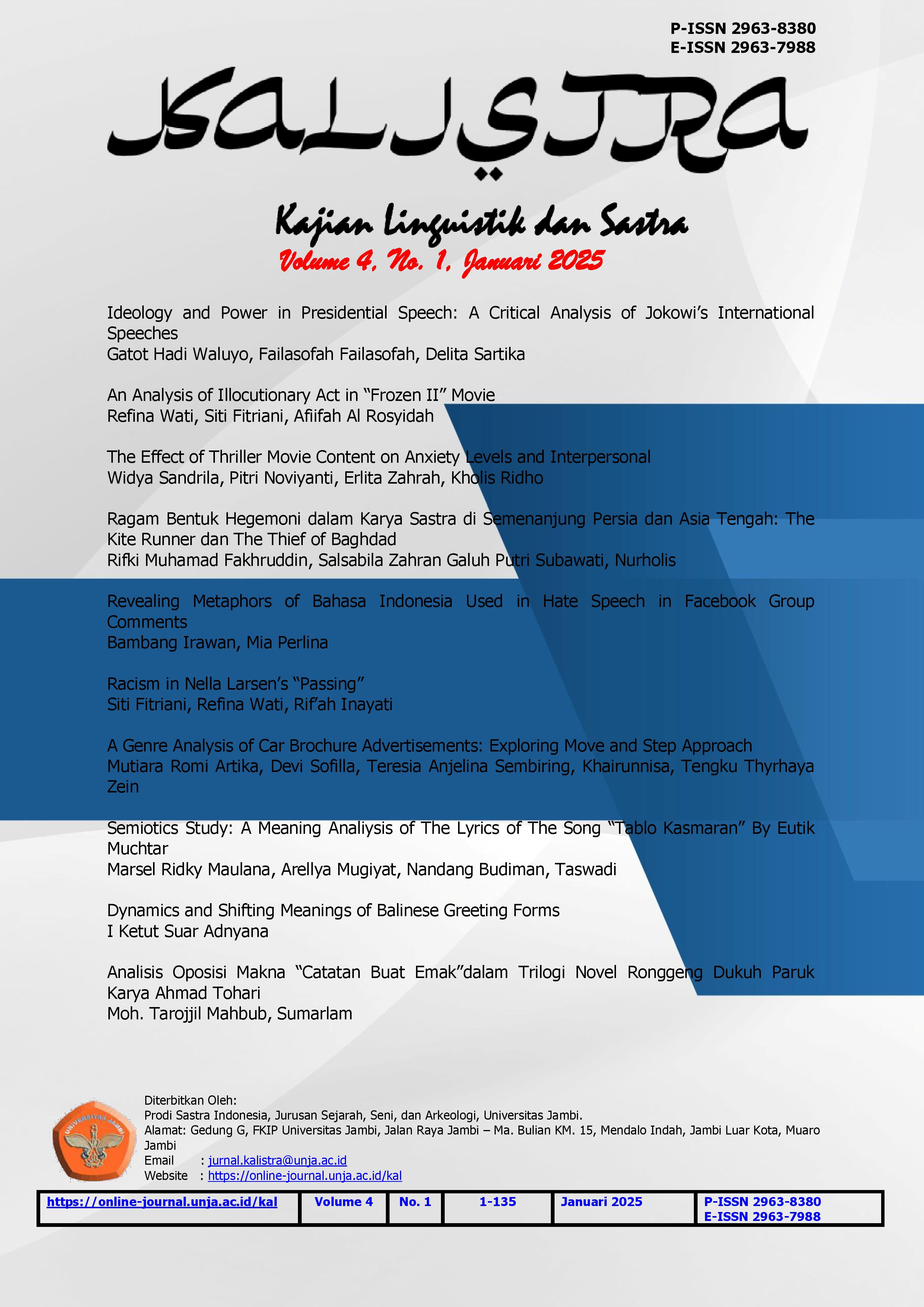Nilai-Nilai Nasionalisme dalam Novel Buya Hamka Karya Ahmad Fuadi: Kajian Poskolonialisme
DOI:
https://doi.org/10.22437/kalistra.v4i1.44334Keywords:
Nationalism, Novel, PostcolonialismAbstract
This study aims to explore the values of nationalism contained in the novel Buya Hamka by Ahmad Fuadi through a postcolonial approach. The background of this research is based on the importance of understanding the spirit of nationalism in literary works, especially within the context of Indonesia's colonial history and its struggle for independence. This study employs a descriptive qualitative method with postcolonial discourse analysis to examine how nationalism is represented through the narrative, characters, and conflicts in the novel. The findings reveal that the novel reflects various forms of resistance against colonialism—intellectual, spiritual, and cultural—portrayed through the figure of Buya Hamka as a symbol of struggle and national identity. Nationalist values such as love for the homeland, awareness of being an independent nation, the spirit of unity, resistance against colonial powers, appreciation of national heroes, and the effort to uphold sovereignty and national dignity are deeply embedded in the narrative. Therefore, Buya Hamka is not only a biographical work but also a literary text that represents the discourse of nationalism in the postcolonial context of Indonesia.
Abstrak
Penelitian ini bertujuan untuk menganalisis nilai-nilai nasionalisme yang terdapat dalam novel Buya Hamka karya Ahmad Fuadi dengan menerapkan pendekatan poskolonial. Latar belakang penelitian ini berfokus pada pentingnya memahami semangat nasionalisme yang terkandung dalam karya sastra, terutama dalam konteks sejarah penjajahan dan perjuangan untuk kemerdekaan Indonesia. Metode yang diterapkan dalam penelitian ini adalah deskriptif kualitatif dengan pendekatan analisis wacana poskolonial, untuk menyelidiki cara nasionalisme dinyatakan melalui narasi, karakter, dan konflik dalam novel. Hasil penelitian menunjukkan bahwa novel ini mencerminkan beragam bentuk perlawanan terhadap kolonialisme, baik dari segi intelektual, spiritual, maupun kultural, yang tergambar melalui sosok Buya Hamka sebagai lambang perjuangan dan identitas bangsa. Dalam alur cerita, terlihat jelas nilai-nilai nasionalisme seperti cinta terhadap tanah air, kesadaran akan identitas sebagai bangsa yang merdeka, semangat persatuan, perlawanan terhadap penjajahan, penghargaan atas jasa para pahlawan, serta usaha untuk mempertahankan kedaulatan dan martabat bangsa. Dengan demikian, novel karya Buya Hamka bukan hanya sekadar sebuah karya biografi, melainkan juga dapat dipahami sebagai teks sastra yang mengandung pemikiran nasionalisme dalam konteks pascakolonial Indonesia.
Downloads
References
Armawi, A. (2019). Nasionalisme Dalam Dinamika Ketahanan Nasional (Edisi 2). Gadjah Mada University Press.
Fuadi, A. (2021) Buya Hamka. Jakarta.
Fals, I., Dzarna, D., Vardani, E. (2023). Nilai Nasionalisme Dalam Novel Habibie dan Ainun Karya Baharudin Jusuf Habibie Dengan Pendekatan Sosiologi Sastra. SASTRANESIA: Jurnal Program Studi Pendidikan Bahasa dan Sastra Indonesia. 11(3). 14-31.
Fanon, F. (2013). Blakc Skin, White Masks. In Journal of Chemical Information and Modeling (Vol. 53, Nomor 9).
Fanon, F. (1963) The Wretched Of The Earth. In The Wretched of the Earth.
Faturochman, A. K. &. (2015). Nasionalisme. Buletin Psikolog, 12(2), 60.
Hidayat, A. (2012). Sastra dan Ilmu Sastra: Pengantar Teori Sastra. Jurnal Pembangunan Pendidikan: Fondasi dan Aplikasi, 2(February), 1–15.
Hilal, I., Anantama, M. D., & Munaris. (2023). Poskolonial: hibriditas (cetakan pertama).
Ramadhani, F. (2024) Jejak Poskolonial dalam Novel William Karya Risa Saraswati. Lingua Skolastika. 3(1).
Santoso, G., Abdulkarim, A., Maftuh, B., Sapriya, & Murod, M. (2023). Kebermaknaan Konsep Nasionalisme, Patriotisme, dan Perjuangan. Jurnal Pendidikan Transformatif (Jupetra), 2(1), 144–156.
Siswanto, W. (2013) Pengantar Teori Sastra. Aditya Media Publishing. Malang.
Downloads
Published
How to Cite
Issue
Section
License
Copyright (c) 2025 Lia Nuraini

This work is licensed under a Creative Commons Attribution-ShareAlike 4.0 International License.
Kalistra: Kajian Linguistik dan Sastra is licensed under Creative Commons Attribution-ShareAlike 4.0 International License.
Authors who publish their manuscripts in Kajian Linguistik dan Sastra agree to the following terms:
1. The copyright in each article belongs to the author.
2. The author acknowledges that Kajian Linguistik dan Sastra reserves the right to be the first to publish under a Creative Commons Attribution-ShareAlike 4.0 International License (Attribution 4.0 International CC BY-SA 4.0).
3. Authors may submit articles separately, arranging for non-exclusive distribution of manuscripts that have been published in this journal to other versions (e.g., delivery to the author's institutional repository, publication into a book, etc.), acknowledging that the manuscript has been first published in Kajian Linguistik dan Sastra.
















